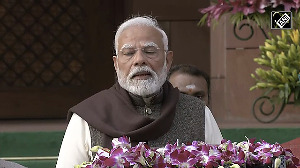The government is planning to grant a 10-year tax holiday to pharmaceutical companies involved in research and development in the country.
"We are strongly favouring such a step for encouraging R&D in the country, as this acquires additional importance in the product patenting regime," said JS Sandhu, joint secretary in the ministry of chemicals and petrochemicals, which is the administrative ministry for pharmaceuticals.
The details of the policy, such as the criteria for companies to qualify for this tax benefit, are being worked out. Once finalised, the proposal will be sent to the finance ministry for approval.
The pharmaceutical industry now enjoys a tax exemption of 150 per cent of the amount invested in research and development, but it was initially granted for five years and then extended by another two years.
A 10-year span will pander to a long-standing demand of the industry, which has been saying that pharma R&D cannot be tied down in strict time-frames. R&D investments by Indian pharma companies have increased manifold in recent years and are likely to continue the climb. The top 12 spent a record Rs 1,063 crore (Rs 10.63 billion) in 2004-05, a rise of 41.5 per cent over the previous year.
Malvinder Singh, president, pharmaceuticals, Ranbaxy laboratories, termed the proposal "very critical" and "excellent". His own company saw the R&D to sales ratio rise from 6.54 per cent in 2003-04 to 8.94 per cent in 2004-05.
For long, the industry has been asking for such a tax concession from the government, as the R&D activity can't be done within a tight time frame, opines DG Shah, secretary general, Indian pharmaceutical alliance.
Shah added that the current two-year tax concession period wherein there is a 150 per cent weighted deduction against the R&D expenditure was a token incentive.
For example, if Rs 100 were spent on R&D and Rs 70 were admitted as R&D expenditure after allowing for deductions, the setoff would come to Rs 105 (150 per cent of Rs 70) and tax benefit would be Rs 35.
Since companies are paying 35 per cent as tax, tax credit come out to be barely 12.5 per cent. He says that this is non-substantial and weighted deduction needs to be meaningful.
While the pharma players have hailed the suggestion, they still feel more can be done. Some feel it ought to be for 20 years at least.
Nicholas Piramal's president, corporate affairs, Harinder Sikka called this a "big step" but added, "More focussed steps need to be taken. This can include subsidies such as the ones given in Europe."
Under the new patent regime, reverse engineering, which for long was the mainstay of Indian pharmaceutical industry, no longer remains a possibility.
"Innovation and discovery of new molecules, delivery systems and formulations is the only way companies can carve out a niche now," said an industry source.






 © 2025
© 2025